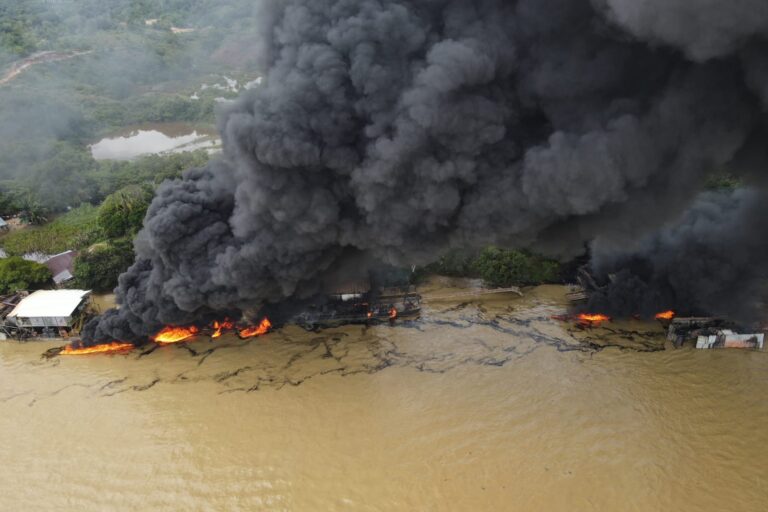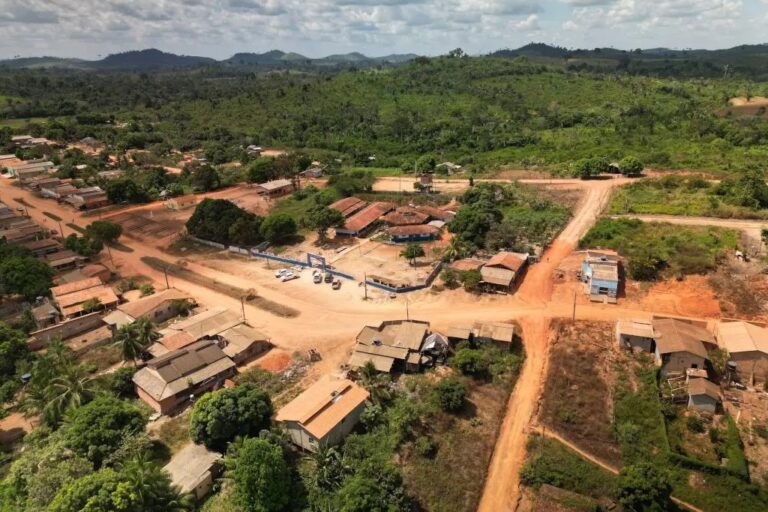- 95 percent of fines issued by IBAMA, Brazil’s environmental agency, are never paid. These fines are worth R$11.5 billion (US $3.5 billion).
- In a new decree, President Temer has offered offenders — including farmers and ranchers responsible for illegal deforestation —an amnesty of 60 percent of fines, provided the remaining 40 percent is paid into a government environmental fund.
- While that fund — if fleshed out — would provide significant amounts of money for environmental agencies, Temer’s decree provides no new and effective means of enforcing the measure.
- The amnesty, as seen by critics, is one in a long series of anti-environmental and anti-indigenous decrees made by Temer in order to buy support from congressional deputies and gain their votes to shelve a second round of corruption charges against the president.

The state of Mato Grosso do Sul has its share of serious environmental problems, with many of its waterways heavily silted and large land areas deforested. It is also the locale for one of country’s most enduring indigenous conflicts: the demoralized but tenacious Guarani Kaiowa — forced to squat on roadsides next to fences erected by cattle ranchers to keep them off their ancestral territory — have one of the world’s highest suicide rates.
Those cattle ranchers have a powerful political voice, through the rural caucus (bancada ruralista), the biggest lobby in Congress, which dutifully represents their interests. It was this consideration that appears to have caused President Michel Temer last week to choose the city of Miranda in Mato Grosso do Sul as the place to announce a new national policy forgiving fines imposed on farmers for illegally clearing forest and committing other environmental crimes as they occupy land to turn into ranches.
IBAMA, the nation’s environmental agency, regularly imposes fines, often after meticulous and dangerous investigations for environmental crimes, but the vast majority, remarkably — roughly 95 percent — are never paid. These outstanding fines are calculated to be worth R$11.5 billion (US $3.5 billion). Temer’s new decree doesn’t provide a new mechanism for forcing offenders to pay up; rather, it provides offenders with an amnesty for 60 percent of the fines, provided the remaining 40 percent is paid into an environmental fund administered by the government.
The decree is seen by many Brazilian political commentators as one of a series of horse-trading concessions made by Temer to federal deputies to ensure his political survival against an onslaught of corruption charges.

The Folha de S. Paulo newspaper reports that the president spent R $32 billion (US $10 billion) between June and October of this year to protect himself. For analysts, the timing of the Mato Grosso do Sul event — 21 October — is significant. It occurred just days before the Lower House was due to decide (for the second time) whether or not to authorize an investigation by the Supreme Court into Temer’s alleged corruption. A two-thirds majority of the Lower House was required for the investigation to go ahead and the rural caucus, which controls about 212 of the 513 deputies, was big enough on its own to veto the investigation. Temer survived the key vote on 23 October.
At a time when the government is dealing with a large deficit, some have been highly critical of the free-and-easy way Temer has disbursed billions in funds. The left-wing party, PSOL (Socialism and Liberty Party), plans to charge the government with abuse of public money among other crimes. Chico Alencar, from the PSOL, told Globo newspaper: “It’s not normal for a deputy to be paid to vote for the government. It’s clientelism.”
But some analysts, such as Daniela Chiaretti from Valor Economico, a newspaper, believe Temer’s environmental fine amnesty could bring major benefits to the environmental sector by bringing in money that might have never been paid. The administration says it expects the decree to raise R $4.8 billion (US $1.5 billion), almost eight times the annual budget of the Ministry of the Environment. That is, of course, if those who have been fined agree to pay what they owe.
Temer’s decree did not include a new enforcement mechanism. So it seems that, just as in the past, offenders will be able to postpone payment indefinitely, while attempts to force them to pay slowly make their way through the courts.
At present, only 5 percent of offenders pay their fines. Unless new enforcement measures are created, it seems unlikely that this payment rate will rise significantly, even with the amnesty.

Fines for environmental crimes have been pardoned in the past. Less than two years ago, the Rousseff government agreed to pardon all fines incurred for illegal forest clearing before 2008. At the time, this accounted for about three-quarters of all such fines. According to the Folha de S. Paulo, this pardon cost the government R$ 8.4 billion (US $2.6 billion).
At the time, the government also set up a program by which 40 percent of the fine was pardoned, provided the remaining 60 percent was spent on environmental projects. However, the scheme was not properly monitored and in 2012 IBAMA ended it.
José Sarney Filho, the Minister of the Environment, is confident that the new scheme will be effective. At Miranda, he said that the decree “changes the environmental paradigm in Brazil.” He went on: “IBAMA will no longer be a body that monitors and punishes, but will become a body that acts effectively with resources and with planning, in [environmental] recuperation and sustainable development.”
The new scheme will differ in some ways from the earlier pardon. One of the most important changes is that the money collected by the government in exchange for the pardon — that is, 40 percent of the original fine — will all be used to invest in priority environmental projects. Under the old scheme the government only invested 20 in the environment; the rest was added to the government’s general tax revenue stream.

In theory, the new amnesty could become an important source of funding for the federal government’s environmental agencies, all of which are reeling under severe cuts in funding. For this reason, it was cautiously welcomed by some environmentalists. Mauricio Guetta, a lawyer from the Instituto Socioambiental (ISA), an NGO, told Valor Econômico: “The decree has a positive aspect and a negative one. The positive is that it will mean that offenders pay for priority projects, like the recuperation of the São Francisco river basin. The negative is that 60 percent of the fine will be pardoned. We believe that this share is far too high.”
However, for the environment to benefit, the new decree must be rigorously enforced.
As it stands, the decree, rather than becoming an effective tool for raising revenue for environmental programs, runs the risk of merely reinforcing the farmers’ view that, if they hang on long enough, their fines will be forgiven in their entirety. In short, Temer’s decree will serve as window-dressing in which the government pardons known environmental offenders for most of their debts and then fails to hold those offenders responsible for keeping their side of the bargain.
FEEDBACK: Use this form to send a message to the author of this post. If you want to post a public comment, you can do that at the bottom of the page.













